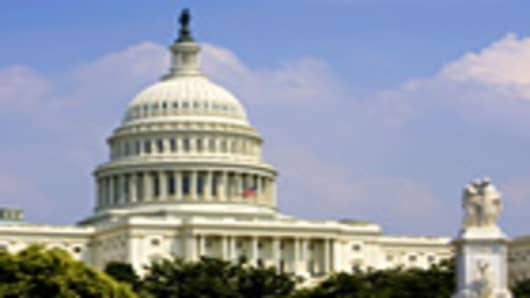The United States of America is swimming in an ocean of debt and Washington’s most recent budget, estimated to increase the federal deficit to at least a whopping $1.35 trillion, threatens to raise sea-levels even higher.
But as Americans wail and gnash their teeth over the profligate spending by the federal government, they should also recognize that austerity is painful and starts at home. If Americans are paying attention, they will speak through their votes in this election year. Specifically, they must insist that state budgets help minimize the spending problem, not exacerbate it, which requires a ‘taming of the fiscal dogs’.
To highlight this issue, I present to you the “CANINes”: California, Arizona, Nevada, Illinois and New York. These are the five worst offending states, according to the Center on Budget and Policy Priorities, in terms fiscal shortfall as a percentage of overall budgets for 2009.
Americans are debating a budgetary boondoggle on the Federal level, without giving due attention to the underlying mess that is contributing to the problem at the state level.
Sadly, and quite worryingly, nearly all remaining states are just varying breeds of CANINes: the Center on Budget and Policy Priorities estimates that in 2009 there were budget shortfalls in 48 of the 50 states, totaling $166 billion in aggregate. In 2010 the shortfall will be in the range of $180 billion. This increase in shortfall from 2009 to 2010 occurs in spite of all of the assistance the states have received through the gargantuan federal stimulus package enacted in 2009.
Higher taxes and reduced services are not an enjoyable combination, but they may be necessary remedies to problems brought on by excesses from the past and politicians’ unwillingness to face challenging issues sooner.
Voters will have the opportunity this fall to play their part in turning the tide towards fiscal responsibility, by holding state officials accountable for their sins and electing those who are committed to making difficult choices that will result in a better future. Instead of voting for politicians looking to placate their constituencies with 'doggie treats' from the federal budget, voters should recognize they are now paying a high price for this type of behavior and that the CANINes will run wild if left without a leash.
For far too long, state and local officials have relied on the federal government to bail them out as they’ve overspent, playing a dangerous game of chicken. In the past this may have seemed manageable, but the current level of fiscal recklessness means that this game is hardly sustainable. The federal budget is out of control and cannot afford to be subsidizing the CANINes any longer. If left unaddressed, the lack of fiscal control will result in much higher interest rates and a drastic reduction in the standard of living across the nation as incomes shrink and the costs of products rise.
As dogs are as much a part of Americana as baseball and apple pie, voters should have no problem keeping the CANINes on their minds as they evaluate candidates this year and head to the polls in November. The fiscal recklessness of states should be a top priority for them as they decide which politicians will most effectively deal with the fiscal crises facing the United States.
It’s time for the CANINes to be put back in the doghouse.
_____________________
Kirby Daley is senior strategist at Newedge Group (a venture between Societe Generale and Credit Agricole), based in Hong Kong. Before that, he worked as a trader in commodities and currencies in both United States and Japan. He appears regularly on CNBC Asia and can be reached directly atKirby.Daley@newedgegroup.com


